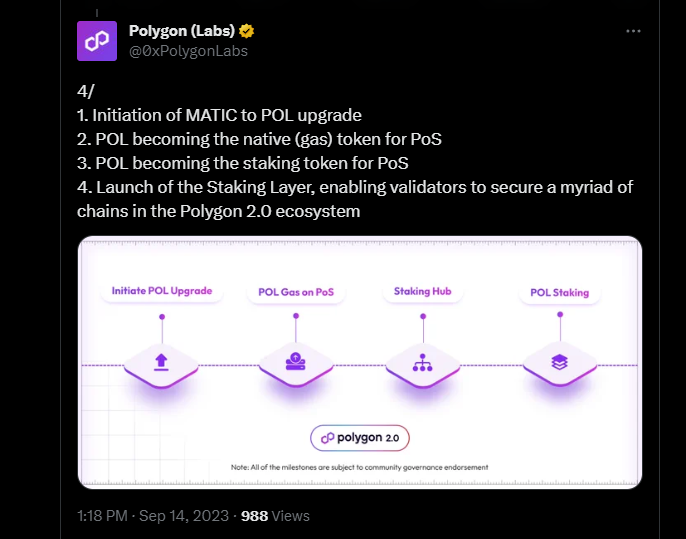Polygon Labs’ vision of an interconnected layer 2 Ethereum ecosystem powered by zero-knowledge cryptography begins in earnest following three inaugural improvement proposals that will begin the transition to Polygon 2.0.
The scaling technology firm unveiled Polygon 2.0 in June 2023, outlining plans for a scaling ecosystem made up of four protocol layers. The staking, interop, execution and proving layers all play a role in creating an interconnected ecosystem of chains that enable fast value transfer and information sharing.
1/ The wait is over. Polygon 2.0 implementation kicks off now with the release of 3 Polygon Improvement Proposals (PIPs), and a roadmap for Phase 0.https://t.co/gk7FW0zCpc pic.twitter.com/YJo3BtQy4y
— Polygon (Labs) (@0xPolygonLabs) September 14, 2023
Polygon co-founder Sandeep Nailwal recently unpacked how the ecosystem aims to become the value layer of the internet by using zero-knowledge technology to provide low fee, high throughput performance to the wider Ethereum ecosystem.
Polygon released three Polygon Improvement Proposals (PIPs) on Sept. 14 for community consideration and voting that are earmarked to begin taking place in the final quarter of 2023.
Related: Polygon’s ‘holy grail’ Ethereum-scaling zkEVM beta hits mainnet
The PIPs outline technical details for “Phase 0” of the establishment of a network of interconnected ZK-powered layer 2 chains that scale Ethereum. This includes a proposal for the transition and specifications that will see MATIC tokens become SOL tokens, which will become Polygon Proof-of-Stake (PoS) protocol’s native token.
PIP-17 will include the initiation of the upgrade from MATIC to POL. This includes its transition to POL as the native gas token and staking token for the Polygon ecosystem, as well as the launch of the staking layer and migration of Polygon public chains.

PIP-18 includes the technical description of POL tokens as well as accompanying contracts that will handle emission and token migrations. POL tokens can be migrated at a one-to-one ratio from existing MATIC tokens. The PIP notes an initial supply of 10 billion and yearly emission of 2% equally distributed between validator staking rewards and a community treasury.
Lastly, PIP-19 proposes the update of the native gas token on Polygon PoS from MATIC to POL while ensuring maximum backwards compatibility.
Polygon’s announcement notes that PIP-19 will not change contracts on Polygon PoS while the properties of the protocols native token will not change either. However contracts on Ethereum that are awaiting MATIC from the native MATIC bridge may be affected by the upgrade.
Magazine: Here’s how Ethereum’s ZK-rollups can become interoperable


